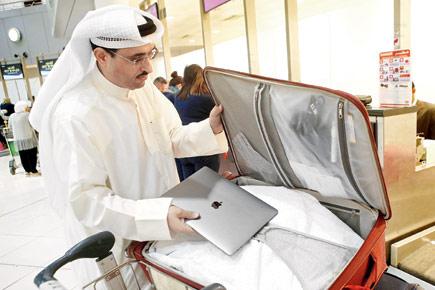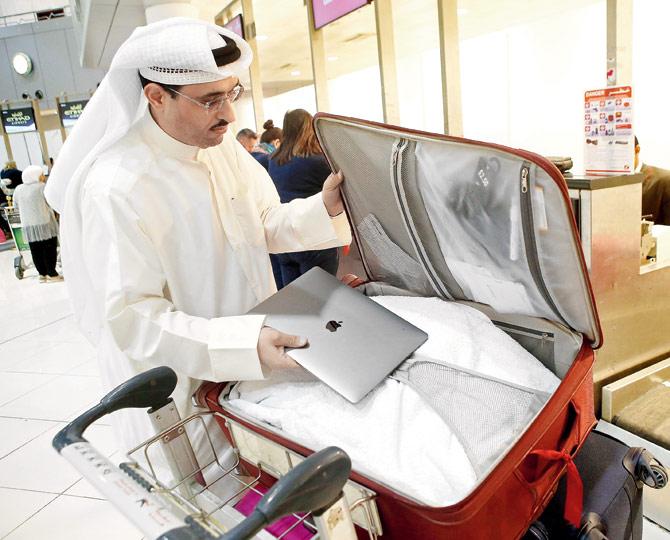The streets are empty of shops, the towns ridden with paranoia and crystal meth - however long Trump lasts, the US is forever changed


Social media activist Thamer al-Dakheel Bourashed puts his laptop in his suitcase at Kuwait airport before boarding a flight to the US, which in March banned fliers from the Middle East from carrying large electronics on board. Pic/AFP
 After reaching New York on Friday night, the next morning I met Emory A, a high school chum I hadn't seen in over 35 years, and we drove north to New Hampshire via Connecticut, Massachusetts and Vermont. During those almost five hours there wasn't a single car on the highways with a 'Trump' bumper sticker. Unlike India, the USA is where people proudly proclaim their nationalism (or their individualism) via bumper stickers. It's less than six months since this polarised nation had an election that surprised even the winners, so to see no Trump bumper stickers, even before President Donald Trump spent three months in office, is noteworthy. Emory explained it as Trumpland experiencing buyer's remorse. Perhaps this is true; but it seems that the changes Trump eventually leaves behind will endure.
After reaching New York on Friday night, the next morning I met Emory A, a high school chum I hadn't seen in over 35 years, and we drove north to New Hampshire via Connecticut, Massachusetts and Vermont. During those almost five hours there wasn't a single car on the highways with a 'Trump' bumper sticker. Unlike India, the USA is where people proudly proclaim their nationalism (or their individualism) via bumper stickers. It's less than six months since this polarised nation had an election that surprised even the winners, so to see no Trump bumper stickers, even before President Donald Trump spent three months in office, is noteworthy. Emory explained it as Trumpland experiencing buyer's remorse. Perhaps this is true; but it seems that the changes Trump eventually leaves behind will endure.
ADVERTISEMENT
America was already changing significantly even before Trump - some say those changes are what produced Trump. Though this column comes less than 36 hours into my trip, and though I'm in New England, which has historically been an irreverent, liberal part of America - heck, they launched a revolution against the British back in 1776 - I noticed some of these changes, possibly because having last been to America in September 2012, I was seeing things afresh.
The first encounter with Trumpland happens even before you leave Asia. On short notice, I booked on a Middle Eastern airline - I refused to book on United Airlines after a video went viral of a Chinese man with a bleeding face being dragged from its aircraft - and though Facebook friends warned that no laptops are allowed on flights from the heart of the Islamic world to America, I paid little attention because my flight was not non-stop. At Delhi, I was told to check in my laptop and so I had to start paying attention.
Once in the Middle East and changing aircraft, we passengers were subject to so much security that our flight was delayed by 90 minutes. I think the Americans went through the luggage hold, piece by piece, while we sat in the aircraft. I can't figure out why they make us remove our belts and shoes; India doesn't find the need to, and we've had our fair share of aviation terrorism. Then, a man with a long-handled technical brush swept over each finger of my outstretched hands; apparently for traces of explosive material or radioactivity. I was allowed to proceed to Fortress America.
Many elderly Malayalis on the flight approved of such security, and will no doubt urge our Great Leader to make air travel in India equally cumbersome. To me though, the paranoia that resulted from the 9/11 attacks has taken on a life of its own. It is used to justify things, like the testing of the "Mother Of All Bombs" on the cavemen of Afghanistan. It suits the defence industry, which cross-subsidises the desolate, non-Coastal America. This paranoiac milieu helped produce Trump. Why would he change course?
Retail shops have disappeared. Streets in cities and towns look bare; only Walgreens, liquor stores and restaurants are visible. An Indian who ran a hardware and furniture store for over 30 years on Broadway and 94th street (he was once in the news for restoring an historic cinema theatre) said he closed shop because e-commerce had made his furniture business redundant: people preferred to buy directly from the manufacturer, online. Roy was stuck with a $1.3 million house in the same north Westchester suburb that my parents used to live in (till my mother's stroke in 2012) because the real estate market was down. As the owner of a small business, he was not optimistic.
On an elevated road I passed by a huge billboard advertising for the US Navy Seals, one of the military's special operations group that had sneaked into Pakistan and assassinated Osama bin Laden back in May 2011. They used to be top-secret. When Emory and I stopped for lunch at a 'Cracker Barrel' in Springfield, Massachusetts, I found the shop selling various T-shirts celebrating different arms of the US military. Along with the paranoia, the militarisation of society has increased.
Decrepit small towns in non-Coastal America that are devoted to the manufacture of crystal methamphetamine are increasing. Emory said such places are best avoided, so we avoided them. The scourge of crystal meth is eating out inner America; I imagine it to be like a large drum of water in a torture-chamber, over which the lower middle-class is hanging upside-down, precariously perched.
But these are merely first impressions. They hardly scratch the surface of a society that has deeply imprinted itself on the rest of humanity. Trumpland will change, Imperial America will change and, naturally, the rest of the world will change. And however long Trump may last, the changes will endure.
Aditya Sinha's crime novel, The CEO Who Lost His Head, is available now. He tweets @autumnshade Send your feedback to mailbag@mid-day.com
 Subscribe today by clicking the link and stay updated with the latest news!" Click here!
Subscribe today by clicking the link and stay updated with the latest news!" Click here!







